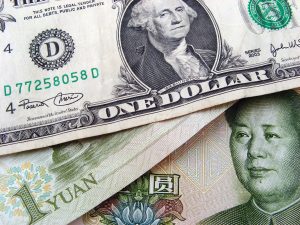Have the pandemic and the trade war disentangled the Chinese and American economies? Not so much, it seems. As both economies have recovered from the pandemic, the upward direction of their trade relationship has reasserted itself. To be clear, some of the specifics have changed as regulations and supply chain disruptions have altered the character of certain relationships. But in fact it is extremely difficult to disentangle major trade relationships, even as political relations between Beijing and Washington have grown more frosty.
A recent study by Mariya Grinberg points out that the idea that belligerents must suspend trade with one another is very recent; as late as World War I, the United Kingdom struggled to eliminate direct and indirect avenues of trade with the Central Powers. Disruption of trade often upsets important domestic constituencies, which try hard to find ways around formal restrictions. The British government struggled to convince British exporters and financiers that the immediate needs of the war trumped their long-term economic interests. But even in the extreme countries at war can continue to trade if they require imports for long-term economic well-being and if they believe that exports cannot immediately be converted to military gain.
We can see the difficulty in disentanglement even under far less dire conditions in the United States. One recent story that highlighted the difficulties of detaching U.S. government purchases from Chinese parts indicated that the Department of the Interior would need to pay eight to 14 times as much for U.S.-made drones than for the Chinese drones it had acquired in the past. The effects of serious disentanglement would have far-ranging effects on U.S. consumers, as well as on producers that depend on Chinese supply chains, and would make a lot of Americans exceedingly uncomfortable about the costs of conducting long-term competition with China.
Interestingly, of the five futures generated by a recent Bloomberg study, the two that envisioned a near complete disconnect in the trade relationship also suggested that the Chinese economy would never catch up with the U.S. economy. It is likely, thus, that significant disentanglement would hurt China more than the United States, although that’s altogether different than saying the U.S. would benefit. In any case, if it is difficult for countries that are actively firing shells at one another to stop trading, imagine how much more difficult it will be to convince Chinese and American consumers that they need to bear the pain of a disengagement.
This is another area in which the Cold War holds misleading lessons. The USSR and the U.S. did not trade extensively in the Cold War, but they did trade in commodities and in a few other kinds of goods. However, the Soviets did not have a consumer economy, and by and large were not interested in either importing consumer goods from the West or producing goods that the West might want. China’s path has been much different, and it has already become a global economic cornerstone in ways which are now difficult to boil away.

































